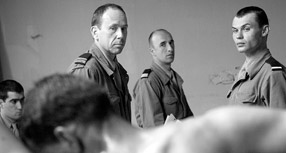 The Algerian War of Independence was a messy protracted affair with a bad reputation of being not only a lost cause but a bad cause. The idea of a "liberation struggle" failed to understand the reasons that the French was in North Africa in the first place. They were there in order to prevent jihad. Before they went in there Algiers was center of a cesspool of piracy and slavery, murder and rape, or jihad, that threatened the entire Mediterranean. It was only after Muslim pirates were put down did the Mediterranean become as safe as it was in Roman times. However, there were and are elements of French society that oppose France's civilizing mission in North Africa. This segment has become culturally dominent after the defeatism of WWII. On another aside I saw the Battle of Algiers at the festival some years back. It convinced me that the French were right to resist the tyranny of muslim rule in North Africa in particular and generally anywhere in the world. We should all resist it. This film also convinced me that the French were doing the right thing by being in North Africa.
The Algerian War of Independence was a messy protracted affair with a bad reputation of being not only a lost cause but a bad cause. The idea of a "liberation struggle" failed to understand the reasons that the French was in North Africa in the first place. They were there in order to prevent jihad. Before they went in there Algiers was center of a cesspool of piracy and slavery, murder and rape, or jihad, that threatened the entire Mediterranean. It was only after Muslim pirates were put down did the Mediterranean become as safe as it was in Roman times. However, there were and are elements of French society that oppose France's civilizing mission in North Africa. This segment has become culturally dominent after the defeatism of WWII. On another aside I saw the Battle of Algiers at the festival some years back. It convinced me that the French were right to resist the tyranny of muslim rule in North Africa in particular and generally anywhere in the world. We should all resist it. This film also convinced me that the French were doing the right thing by being in North Africa.The movie is about overly sensitive young lawyer who volenteers after a failed love affair. He ends up in the small algerian town of Saint Etienne as a Lt. Lt Guy Rossi is assigned by his new CO Col Duplan to set out a legal way that the army can act with extra police powers in the pursuit of the terrorists. Initial investigations are successful eventually the hunt for the terrorists expands over much more of the town. And the fight is against terrorist, there are numerous terror incidents depicted. A public square is grenaded, an informer murdered and a cafe bombed. Practices that are commonly seen today. Only the suicide bombers are missing.
The torture and intergation was handed much more professionally than as depicted in The Wind That Shakes The Barley. Every thing was legal. The interogations were preformed calmly with the "absence of malice". A doctor is called afterwards to give a clean bill of health. The torture techniques are mainly electroshock and inmersion. Some other more routine police techniques are used such as obtaining confessions by saying that a prisoner's comrade has already confessed. There is also a reference to a book writen by parachute chaplain that the Spanish Inquistion help protect Christianity from schism. There were no Spanish Protestants or any other variety of free thinker for that matter until Napoleanic times.
The are a two Pieds-Noir in the film. Both are depicted badly. There is the local police chief in Saint Etienne who is joyously corrupy and brutal. There is the school teacher who is befriended by Rossi. The school teacher is a traitor who collaborates with the terrorists, and continues to do so even after he loses an arm in a grenade atttack. The Pieds-Noir are not mainly of French extraction by also come from a variety of Christian Mediterranean backgrounds. After the French abandoned Algeria nearly all of the non-muslim population left within months.
Question I didn't ask: If the French had to get out of Algeria isn't it reasonable that a some point the Algerians should get out of France. I didn't ask this question because I could sense a lot of "anti-colonialism" in the audinence. Also I was wearing a trench coat and a beret. I did not people to assume I was farther right than I am.
What I learned: Even legality doesn't make it feel right.

No comments:
Post a Comment